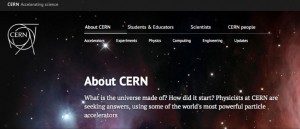CERN discovers 2 new subatomic particles
GENEVA — Scientists at the world’s largest smasher said Wednesday they have discovered two new subatomic particles never seen before that could widen our understanding of the universe.
An experiment using the European Organization for Nuclear Research’s Large Hadron Collider found the new particles, which were predicted to exist, and are both baryons made from three quarks bound together by a strong force.
In a statement Wednesday, officials at the lab known by its French acronym CERN announced the discovery, which could shed more light on how things work beyond the “Standard Model” physics theory explaining the basic building blocks of matter. The results also were submitted to the publication Physical Review Letters.
“Nature was kind and gave us two particles for the price of one,” said one of the CERN collaborators, Matthew Charles, of the CNRS’s LPNHE laboratory at Paris VI University.
The new particles are more than six times as massive as the protons that scientists have been deliberately crashing into each other in a 17-mile (27-kilometer) tunnel on the Swiss-French border near Geneva to see what they can discover about the makeup of the universe and its tiniest particles.
The heavier weight of the two particles is due in part to their “spins” in opposite directions which is “an exciting result,” said Steven Blusk of Syracuse University in New York.
CERN-based physicist Patrick Koppenburg said the study, using data taken during 2011 and 2012, could help differentiate between Standard Model effects and “anything new or unexpected in the future.”
Teams of thousands of CERN scientists also used the state-of-the-art particle accelerator to discover the subatomic particle known as the Higgs boson, without which particles wouldn’t hold together and there would be no matter. The discovery helped Peter Higgs win the Nobel Prize by proving his theories right.















